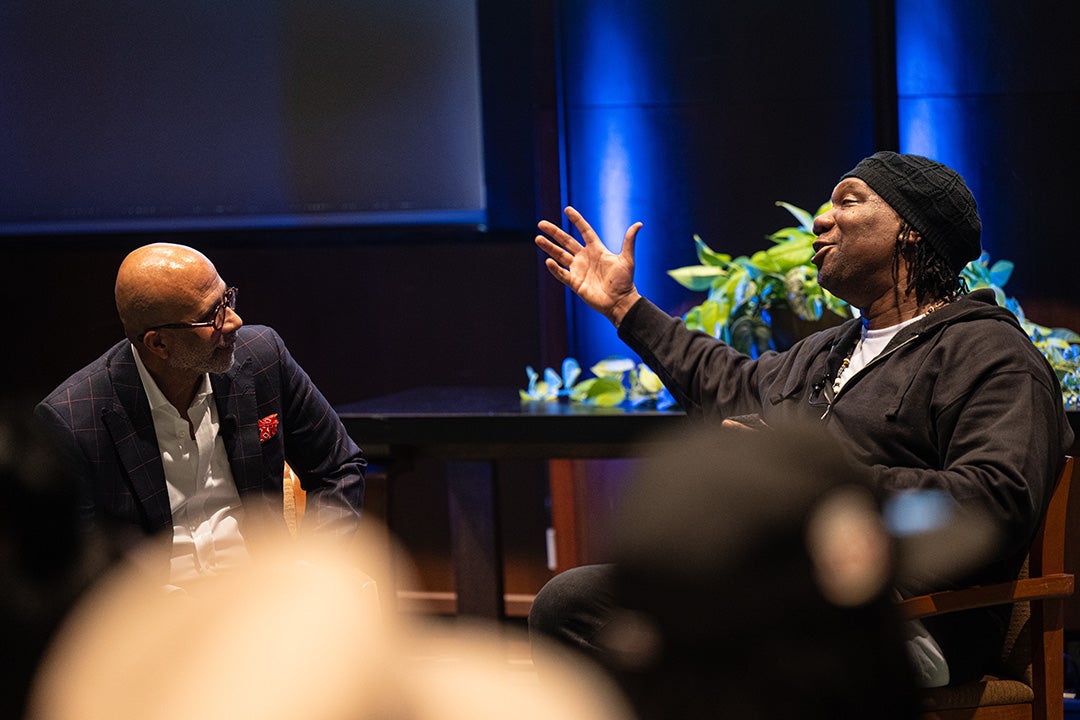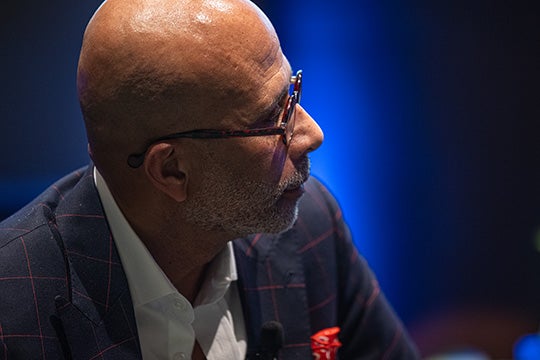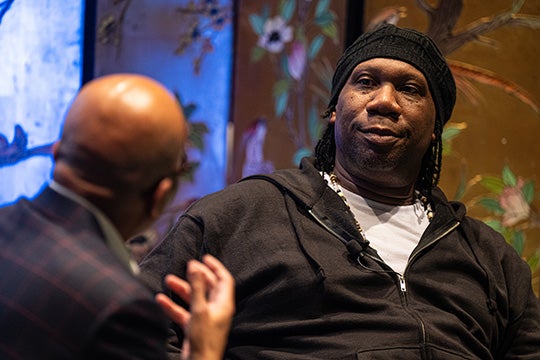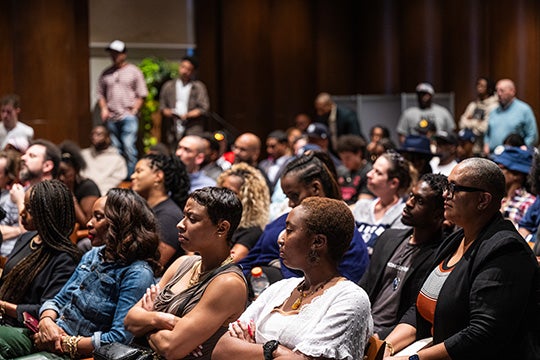
Billed as “One-on-one with the Teacha,” a March 7 event hosted by the Center for Engaged Research and Collaborative Learning (CERCL) featured an intimate conversation with hip-hop legend KRS-One and quite the surprise for several of its organizers. The dialogue was another installment in CERCL’s Hip Hop Archival Collection’s Oral History Series held by Fondren Library’s Woodson Research Center, which aims to highlight and appreciate hip-hop’s cultural and social impact on local and global communities.

Founded by Anthony Pinn, a leading scholar in religion, race and popular culture, after he joined Rice in 2003, the Hip Hop Archival Collection preserves hip-hop’s importance for future generations while underscoring its role as a space where community and intellectual leadership is generated and cultivated.
“I thought Rice had a larger obligation,” said Pinn, Rice’s Agnes Cullen Arnold Professor of Humanities and professor of religion. “We had the resources to help the hip-hop community preserve its historical and cultural memory and make certain that what hip-hop entailed was available for generations to come.”
The oral history archives include interviews with HaviKoro Crew, K-Rino, Mike Frost, Pimp C, Scotty ATL, SwishaHouse, Too $hort, Will “Def Jam Blaster” Ross and now KRS-One. Short for “Knowledge Reigning Supreme,” KRS-One boasts an impressive career with 20 albums and numerous collaborations with other artists. He’s lectured at more than 500 U.S. universities and authored three influential books: “The Science of Rap,” “Ruminations” and “The Gospel of Hip Hop.” Additionally, he founded the Stop The Violence Movement, influenced the creation of the anti-gang anthem “We’re All in the Same Gang” and advocated against sacrificing humanity for technological advancement through Human Education Against Lies. He established the Temple of Hip Hop in 1996 for spiritual exploration within the culture.

“I think it’s important for folks to recognize how important he is in terms of preserving the thought and the activities of hip-hop culture writ large,” Pinn said, who is also the founding director of Rice’s Center for African and African American Studies.
KRS-One famously argued that “rap is something we do; hip-hop is something we live,” introducing the “I am hip-hop” philosophy in 1994.
“We’re going to invite KRS-One to come back next year to teach his two-day certificate program on the history of hip-hop culture,” Pinn said. “It’ll be an opportunity to bring folks from the community back on campus and provide Rice recognition in terms of the importance of hip-hop that extends beyond the region.”
As Pinn’s conversation with KRS-One wrapped up and he thanked the audience for coming, Benita Ledet popped up and grabbed the mic, asking Pinn, CERCL associate director Maya Reine and CERCL affiliate Aundrea Matthews to come to the front of the room.
“It came as a surprise,” Pinn said. “I was just speechless.”
The surprise was Ledet’s presentation of certificates announcing Pinn, Reine and Matthews had been selected for the President’s Call to Service Award (PCSA), also known as the President’s Lifetime Achievement Award.
“This is an incredible honor,” Rice Provost Amy Dittmar said. “This recognition underscores Rice’s deep-rooted commitment to social responsibility and civic engagement. Dr. Pinn’s leadership and the collective efforts of our dedicated colleagues serve as an example to us all, reinforcing our university’s mission to make a positive impact on our community.”
The President’s Council on Service and Civic Participation (PCSCP) established the award to acknowledge the vital contributions of volunteers to America’s strength and identity. It honors individuals whose service benefits communities nationwide, motivating others to take action. Administered by AmeriCorps and Points of Light, the PCSA persists across administrations, recognizing outstanding volunteers who give hundreds of hours each year to address national challenges.
“None of us really anticipated this kind of recognition for the work,” Pinn said. “We do it because this is what we should be doing.”

While the presentation happened at the Hip Hop Archives event, the certificate represents the community outreach, research innovation, integrated learning and residency programs led and facilitated by Pinn, Reine and Matthews. Those include CERCL’s high school essay contest, which strengthens Rice’s connection with economically disadvantaged high school students from the Houston Independent School District who are underrepresented in its undergraduate population. Through an essay contest, students are prompted to brainstorm innovative solutions to local community issues. Winners receive scholarships and a Princeton Review SAT Preparation course held at Rice. Additionally, all participants are invited to a workshop at Rice where they receive guidance from admissions and financial aid counselors.
“Students who participate in this essay contest and then apply to Rice have an acceptance rate of roughly 15%, which is way better than the national average,” Pinn said.
CERCL also offers an artist-in-residence program, which brings in notable contributors to the arts such as Harrison Guy, Lanecia Rouse Tinsley, Deborah D.E.E.P. Mouton and Gabriel Martinez to Houston. The program aims to deepen this engagement, emphasizing how art serves as a tool for critical thinking, effective communication and community engagement. Each year-long residency involves the creation of original projects aligned with CERCL’s mission and goals.
“We just think that there are ways in which Rice and the larger Houston community ought to partner,” Pinn said. “There’s so much we learn from Houston, and we ought to take advantage of that. As a thank you, we want to make our resources available to the city.”
That mentality, along with thousands of volunteer hours to make the programs happen, is what ultimately earned Pinn and his CERCL colleagues the most prestigious of the awards offered by the PCSCP.
“They have demonstrated exceptional leadership and dedication in their efforts to bridge academia with community outreach, enriching the lives of countless individuals in the process,” said Kathleen Canning, Rice’s dean of humanities. “Their visionary initiatives have not only preserved cultural heritage but have also empowered marginalized communities and fostered meaningful connections between Rice and the broader Houston area.”
“We do the work because, from our vantage point, this is our obligation,” Pinn said. “Rice has responsibilities that include what takes place within the hedges, but we have an obligation to the larger Houston community. So we do the work because this is what we should be doing.”
Learn more about the work CERCL is doing here.

